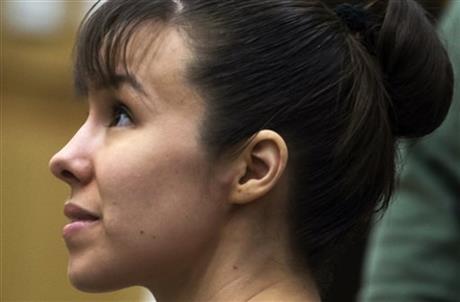
By BRIAN SKOLOFF and BOB CHRISTIE
FILE – In this July 16, 2013 file photo, convicted murderer Jodi Arias appears for a hearing in Maricopa County Superior Court in Phoenix. Arias’ attorneys want a judge to allow them to monitor the Twitter accounts of jurors seated in her murder trial to be certain panelists aren’t communicating details about the case until the proceedings are concluded, according to a motion filed Wednesday Aug. 21, 2013. (AP Photo/The Arizona Republic, Mark Henle, Pool, File)
PHOENIX (AP) — The judge overseeing the case of Jodi Arias put off setting a date for the convicted killer’s sentencing phase retrial Monday to give prosecutors time to respond to a defense request for the Twitter user names of jurors.
The request filed last week by Arias attorney Kirk Nurmi said the user names were needed so jurors’ interactions with others on the social media site could be monitored during the trial. He cited an exchange a backup juror had on Twitter during Arias’ original trial and the ability of other users of the social media site to send messages directly to jurors that might influence their decision.
Legal experts said the motion reflects the challenges courts face in dealing with social media during trials, and they believe the request could give jurors another reason to try to avoid sitting on the case. It also raises questions about the privacy of jurors, they said.
“There are just too many constitutional rights that would be violated,” said Michael Cardoza, a San Francisco defense attorney. “What’s next? Put a 24-7 guard on them? At some point, you just have to rely on the integrity of the jurors.”
Arias was convicted of first-degree murder on May 8 in the 2008 death of boyfriend Travis Alexander in his suburban Phoenix home. The same jury failed to reach a decision on whether she should get the death penalty, setting the stage for a second penalty phase.
Arias, 33, appeared in court Monday dressed in faded black and white striped jail garb, her black hair pulled into a bun and wearing wire-rimmed glasses. She said nothing during the minutes-long hearing. She nodded to a member of the audience as she was led out of the courtroom.
Judge Sherry Stephens delayed setting a date for the new sentencing phase trial, saying she needed the prosecution’s response to the Twitter request and one seeking to limit live television coverage of the trial. Those requests will be heard Sept. 16.
That live coverage helped turn the months-long trial into a hit on websites and cable TV, drawing hordes of spectators and media to the case.
Cardoza and Loyola Law School professor Laurie Levenson both said they thought Stephens would deny the Twitter motion.
“To give a convicted murderer and her team wholesale access into your personal information, that seems to go against the general approach of the court to try to protect the jurors while also conducting a fair trial,” Levenson said.
Although many Twitter accounts are public, there’s no guarantee the defense could find all of the Twitter handles. Someone with a common name would be hard to find, and some have private accounts and Twitter handles not easily tied to their names.
Judges admonish jurors to avoid talking about a case during trial, following media coverage and engaging in social media exchanges while the case is being heard. But Nurmi wrote that the admonition alone, without the ability to monitor jurors’ social media activity, could affect his client’s fair trial rights under the 6th Amendment.
“If every juror were to understand and follow this warning throughout the entire trial there would be no issue with a juror choosing to “tweet” information about the case,” Nurmi wrote. “However, even a juror that follows this admonition could still receive a tweet containing extraneous information.”
A University of Dayton law professor who has written a book on social media use and courts said judges are struggling to figure out how to supervise jurors in the digital age. Jury instructions should be clearer, with an explanation of why it is important not to use social media during trial.
Thaddeus Hoffmeister said a better approach is for attorneys to ask questions of prospective jurors during selection process, and excuse those “who can’t go a week without going onto social media.”



